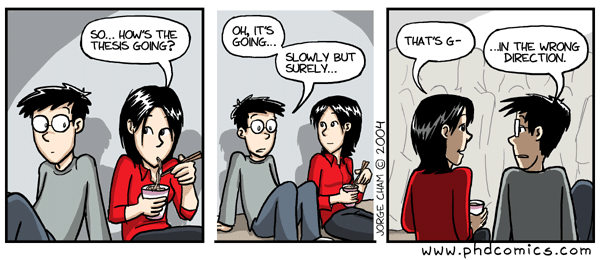 “Piled Higher and Deeper” by Jorge Cham
“Piled Higher and Deeper” by Jorge Cham
www.phdcomics.com
I think in every dissertation comes the time when you think: “I’ll never be able to do this. It is too hard. It is too complicated. My topic has absolutely no relevance whatsoever. I can’t make heads nor tails of it. I don’t even know what I’m doing here. I’ll quit.” Often more than once.
This is normal.
Yes, normal. Everyone experiences it. When you are working on a “dissertation class of project”, it’s easy to become overwhelmed by the sheer size of the problems that accumulate before you. You have to make decisions under uncertainty, find a topic, conduct studies, learn the necessary skills, set strict priorities, prepare publications, do presentations, accept hard feedback, learn in grad school, work on your own and with others, deal with the lack of spare time, accept and overcome setbacks and disagreements … a dissertation is not easy. And it can make you question yourself, your intelligence, your skills, your worth as a scientist … or human being.
All I can say at the moment is that these phases of despair, of negative emotions the depth of the Mariana Trench (and as dark), are normal … and will pass.
It’s easy to quit — the topic or the dissertation itself. And, yes, sometimes this is a good idea. Not everyone will be happy being a PhD, and if you realize that you don’t really want to become a PhD, it is better to quit (unless you can use the title for something else later — titles have side-benefits). And some topics are simply unsuited for research and should be avoided. No use digging in a hollowed out piece of dirt, or trying to realize something that is not yet technically possible. But I think that in most cases people confuse a difficult section of work with an all-out impossible work, or think that the normal problems and setbacks mean that they are too stupid for doing a PhD thesis, instead of seeing the problems as normal and expected — and solvable.
Some people even change from topic to topic in the hope of finding the one topic that ‘fits’. The one topic where everything runs smoothly without problems. They see a smooth dissertation as necessary indicator for their competence and the suitability of the topic. But this one topic does not exist. You are doing research. You’re on the part of the map that says “Here be dragons.”. Of course it is hard, difficult and sometimes overwhelming.
So, instead of hoping for a smooth ride or marinading in despair, learn to deal with the problems, with the setbacks. Seek help, ask your advisers and fellow PhD students for specific problems. Get a strong net of social support, set priorities and concentrate on the core of your dissertation, and, yes, hang in there.
With persistence and determination you will find a way past the mountain — and you will learn a lot from it. You may even enjoy the trip — in retrospect.
Note: You find a more detailed view on the crises during a dissertation/PhD thesis (yes, there are more than one crisis) in the posting: Dissertation Crises.
Thanks, Daniel. We all need to hear this.